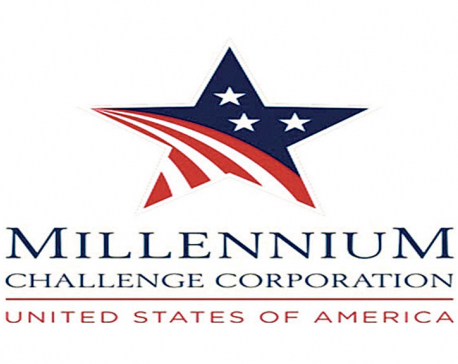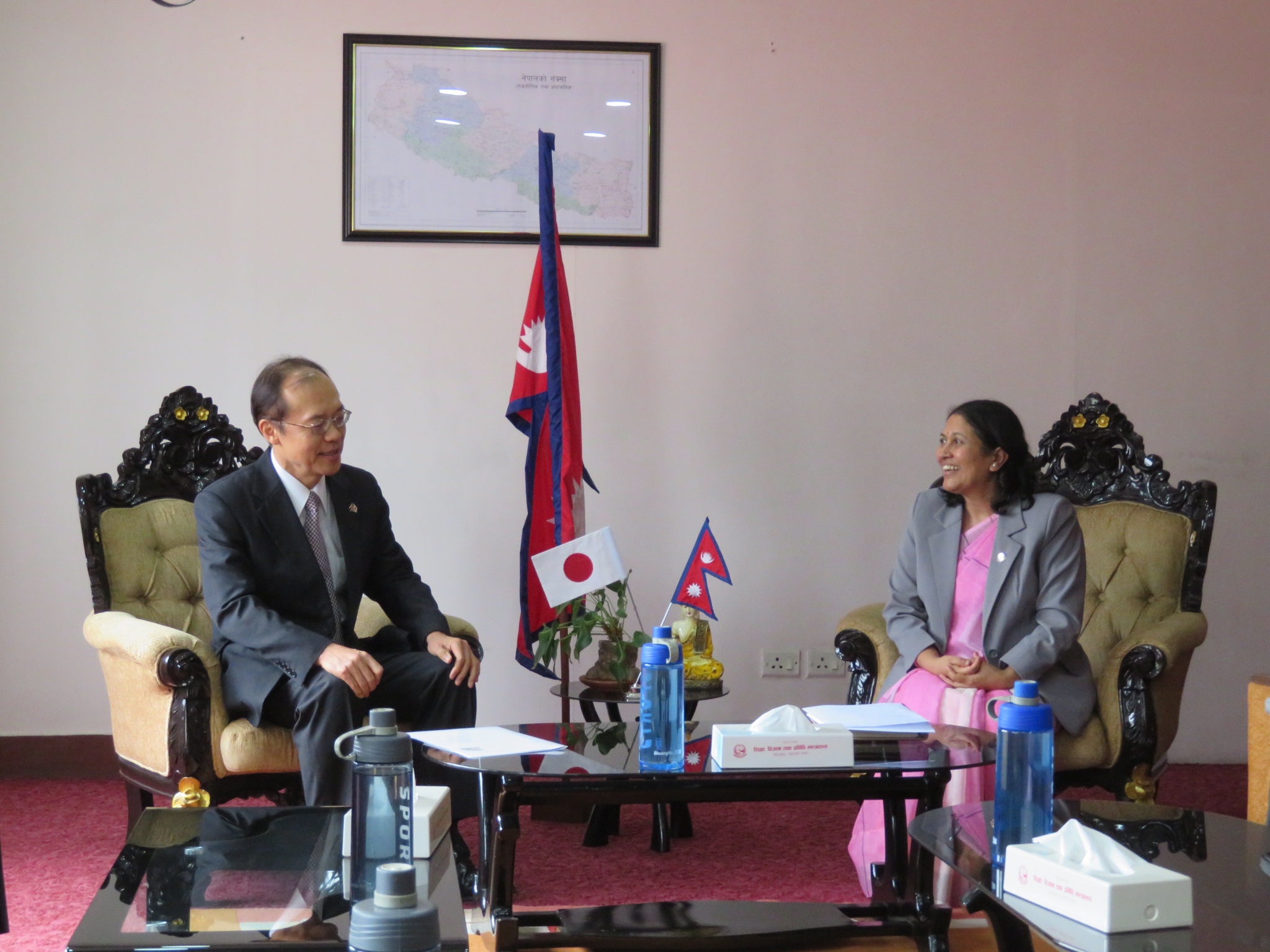
OR
US seeks to further deepen military cooperation with Nepal
Published On: February 26, 2019 05:59 AM NPT By: Kosh Raj Koirala | @KoshRKoirala

Analysts in Kathmandu have interpreted the renewed interest of the US to further deepen military cooperation as the desire of US to bolster cooperation in security and political fronts as well, besides its decade-long cooperation in socio-economic development.
KATHMANDU, Feb 25: Visiting US Deputy Assistant Secretary of Defense for South and Southeast Asia Joseph H Felter has expressed the desire to further deepen military cooperation with Nepal.
While calling Nepal an “important security partner” of the US in South Asia, Deputy Assistant Secretary Felter expressed willingness of the US government to further enhance military to military cooperation in various areas such as capacity enhancement, military professionalization, civil-military relations and modernization of the army. He also pledged to extend support for military hardware and Nepal Army's efforts to establish National Defense University.
Stating that the US has enduring partnership with the Nepalese military since long ago, Deputy Assistant Secretary Felter, who is among senior US Defense official of the Trump administration visiting Nepal, said he was in Kathmandu to ask what Nepal was in need of.
“From the defense perspective, Nepal is an important security partner. It has important role to play in regional stability,” he told a select group of journalists in Kathmandu on Monday.
The visit of Felter, who serves as the principal advisor to senior department leadership for all policy matters pertaining to development and implementation of defense strategies and plans for the south and Southeast Asia, to Kathmandu comes in the wake of controversies surrounding the Indo-Pacific strategy, especially after the visit of Foreign Minister Pradeep Kumar Gyawali to Washington in December, and the souring relations between Kathmandu and Washington following statement from the ruling Nepal Communist Party (NCP) Chairman Pushpa Kamal Dahal on the ongoing political crisis in Venezuela. The statement had criticized the US and its allies for what it called intervening in internal affairs of Venezuela and orchestrating a 'coup'.
Although Felter, according to sources, did not mention anything about the Indo-Pacific strategy in all his bilateral meetings, analysts in Kathmandu have interpreted the renewed interest of the US to further deepen military cooperation as the desire of US to bolster cooperation in security and political fronts, besides its decade-long cooperation in socio-economic development. Last month, commander of the US Indo-Pacific Command Admiral Philip S Davidson had visited Kathmandu to bolster military cooperation with Nepal.
A recently unveiled Asia Reassurance Initiative Act of the USA has outlined a number of strategies to promote its security interest in the Indo-Pacific region , with a provision to appropriate $1.5 billion for each fiscal year from 2019 through 2023. This includes expanding defense cooperation with its democratic partners in South Asia including Nepal, Bangladesh and Sri Lanka.
While dismissing suggestions that the Indo-Pacific Strategy was a military alliance and that it was aimed at containing the rise of China, Felter said that this strategy aims to build capacity of its partners to build their capacity to defend their sovereignty and safeguard the rule-based world order.
“The Indo-Pacific Strategy focuses on working with partners across Asia-Pacific region to build their capacity to secure their independence. They are protected by rule-based international order and they are not going to be threatened,” he said.
Felter, who was flanked by US Ambassador to Nepal Randy Berry, also clarified that Nepal had not been asked to choose side between countries even as the US recognizes Nepal as a part of its broader Indo-Pacific Strategy.
“This strategy aims at building Nepal's capacity to defend its interest and sovereignty. We want independent, prosperous and securely independent Nepal. That's our interest. That's your interest. That is our shared interest,” he said.
Asked if the Indo-Pacific Strategy was aimed at countering China's Belt and Road Initiative (BRI), Felter ruled out those suggestions, while adding that some of the activities of China as a part of the BRI had been a matter of concern for all.
“It is our interest to have constructive relations with China. But to be clear there are some activities that China is engaged in have been the cause of concern,” he said.
While citing examples of the Maldives, Sri Lanka and Malaysia, Felter said that some activities associated with the BRI have been seen very much in the interest of China, but not necessarily in the interest of the host countries.
“We welcome constructive relations with China. We welcome investment from China. But the bottom line is that it has to serve the interest of Nepal,” he further said.
Felter expressed hope that China would improve transparency and quality of its investment and ensure that its activities support the interest of countries like Nepal just as its own.
“Let us encourage China to change its policy. We welcome China to participate in this rule-based international order. The Indo-Pacific Strategy is all about safeguarding this rule-based order,” he added.
During his stay in Kathmandu, Felter held meeting with Prime Minister K P Sharma Oli, Deputy Prime Minister and Defense Minister Ishwar Pokharel, Foreign Secretary Shanker Das Bairagi, Defense Secretary Reshmi Raj Pandey and Chief of Army Staff General Purna Chandra Thapa. These meetings focused on exploring ways to further consolidate bilateral relations in the changed domestic and regional contexts.
Talking to media persons after the meeting with Felter, Defense Minister Pokhrel said he briefed Felter about the new national security policy, streamlining the security agencies and further strengthening the security forces in Nepal, ,reported RSS. Minister Pokharel said that although Nepal will not participate in the international and regional military alliances, there will always be cooperation between Nepal and the US in enhancing military ties.
You May Like This

Nepal writes to the US to clarify ‘controversial’ provisions of MCC agreement
KATHMANDU, September 4: Amid criticisms over some of the provisions of the Millennium Challenge Corporation (MCC) agreement, Nepal has requested... Read More...
_20201014060614.jpg)
Nepal abstains from voting as UNHRC adopts resolution against Sri Lanka's human rights record
KATHMANDU, March 23: Nepal has chosen to abstain from voting in the United Nations Human Rights Council on a resolution... Read More...

Nepal, US partner to strengthen public health in Karnali
KATHMANDU, Sept 27: Karnali Province’s Ministry of Social Development (MoSD) and the United States Agency for International Development (USAID) Nepal Mission... Read More...










Just In
- Japanese envoy calls on Minister Bhattarai, discusses further enhancing exchange through education between Japan and Nepal
- Heavy rainfall likely in Bagmati and Sudurpaschim provinces
- Bangladesh protest leaders taken from hospital by police
- Challenges Confronting the New Coalition
- NRB introduces cautiously flexible measures to address ongoing slowdown in various economic sectors
- Forced Covid-19 cremations: is it too late for redemption?
- NRB to provide collateral-free loans to foreign employment seekers
- NEB to publish Grade 12 results next week








Leave A Comment